#marketing ads
Photo

(via Unlocking Success: System Exclusive Traffic Review Unveils Game-Changing Strategies!)
#System Exclusive Traffic Review#System Exclusive Traffic#Marketing#Marketing Ads#Traffic#Digital Marketing#Affiliate Marketing
3 notes
·
View notes
Text
LinkedIn Ads are used to promote businesses on LinkedIn, targeting professionals based on job title, industry, and other professional criteria. They are important for B2B marketing, building brand awareness, and generating leads. Benefits include precise targeting, reaching a professional audience, and various ad formats such as sponsored content, text ads, and InMail. Effective use involves creating engaging content, leveraging LinkedIn's targeting capabilities, and regularly monitoring campaign performance.
For more details, you can check out the full article here.
#platform of advertisement#fo llow#mark e ting#m arketing#creative advertising#marketing ads#linkedin ads#linkedin#advertising#ads
0 notes
Text
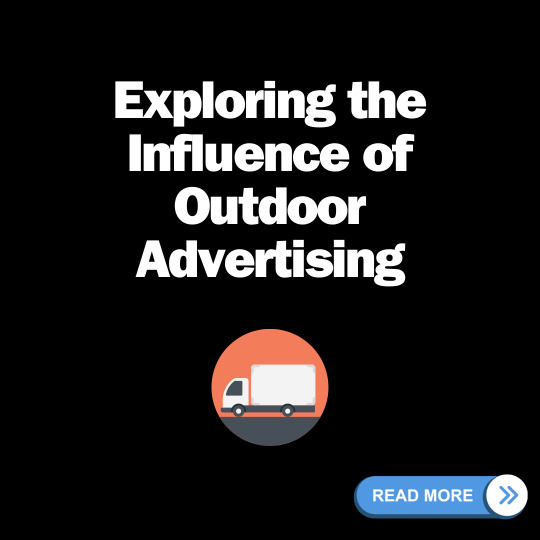
Exploring the Influence of Outdoor Advertising
Outside of traditional billboards, Out-of-Home (OOH) advertising is now present in a variety of locations where people spend their time. OOH advertisements interact with customers directly and integrate seamlessly with the digital environment, offering plenty of visibility and networking opportunities. OOH advertising is common in large cities like Miami, Florida, and throughout the picturesque landscapes of California, from the bustling streets of Los Angeles to the iconic cityscape of New York. Mobile billboards are a noteworthy option for advertising purposes because of their cost-effectiveness and strategic placement, which are crucial factors to understand in order to gauge their influence.
Mobile billboards provide many benefits over stationary ads, such as being more affordable for companies of all sizes, reaching a wider demographic because they visit several sites every day, and having less competition.
Their flexibility enables them to quickly conform to changing customer preferences, and their integration with digital initiatives raises brand awareness and increases engagement. Mobile billboards provide a platform for creative ideas, drawing in viewers and encouraging interaction because of their conspicuous exposure and creative potential.
Are you prepared to investigate how outdoor advertising is changing? Explore the world of mobile billboards and learn how they affect urban areas' visual environments. Whether positioned along the picturesque highways of California or the busy streets of Chicago, mobile billboards provide a distinctive viewpoint on modern advertising. Get in touch with us to find out more about the effects of outdoor advertising and how they affect our day-to-day lives.
1 note
·
View note
Text
Influencer Marketing Campaigns
HS Digital Media: Your Partner in Crafting Impactful Influencer Marketing Campaigns
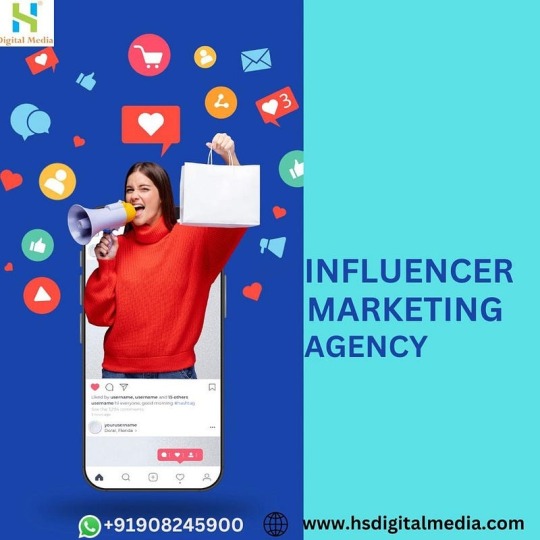
In today’s digitally connected world, influencer marketing has emerged as a powerful tool for brands to connect with their target audience in authentic and engaging ways. As aninfluencer marketing agency committed to delivering exceptional results, understands the importance of leveraging influencers to drive brand awareness, engagement, and ultimately, ROI. Let’s explore some of the specialized influencer marketing services we offer:
Travel Influencers Mumbai: Inspiring Wanderlust and Exploration
Mumbai, with its bustling streets and vibrant culture, is a city of endless adventures waiting to be explored. Our travel influencer marketing services are designed to help travel brands, tourism boards, and hospitality businesses tap into Mumbai’s avid travelers and adventure seekers through captivating content created by local travel influencers. From breathtaking destination guides to immersive travel experiences, our team at HS Digital Media partners with Mumbai’s top travel influencers to showcase your brand’s offerings and inspire wanderlust among your target audience.
Influencer Marketing ROI: Maximizing Your Investment
At HS Digital Media, we understand that measuring ROI is essential for any successful influencer marketing campaign. That’s why our team employs advanced analytics tools and techniques to track and measure the performance of every influencer partnership we execute. From reach and engagement to website traffic and conversions, we provide our clients with comprehensive insights and reports that demonstrate the tangible impact of their investment in influencer marketing, enabling them to optimize strategies and drive maximum ROI.
Fitness Influencer Marketing: Motivating Audiences to Lead Healthy Lifestyles
In a city where fitness is not just a trend but a way of life, partnering with fitness influencers can be a powerful way for brands to connect with health-conscious consumers. Our fitness influencer marketing services are tailored to help fitness brands, wellness companies, and lifestyle brands leverage the influence of Mumbai’s top fitness influencers to inspire audiences to lead healthy and active lifestyles. Whether it’s promoting fitness apparel, health supplements, or wellness retreats, our team at HS Digital Media collaborates with fitness influencers to create inspiring and motivational content that resonates with your target audience.
Video Content Influencers: Harnessing the Power of Visual Storytelling
Video content has become increasingly popular across social media platforms, making video content influencers a valuable asset for brands looking to engage their audience through captivating visual storytelling. Our video content influencer marketing services are designed to help brands partner with Mumbai’s top video creators and YouTubers to create compelling video content that resonates with their target audience. Whether it’s product reviews, tutorials, or vlogs, our team at HS Digital Media works closely with video content influencers to create authentic and engaging content that drives engagement and builds brand affinity.
Influencer Marketing Tools: Streamlining Campaign Execution
Executing successful influencer marketing campaigns requires the right set of tools and resources. At HS Digital Media, we leverage a range of influencer marketing tools and platforms to streamline campaign execution and ensure seamless collaboration between brands and influencers. From influencer discovery and relationship management to campaign tracking and performance analytics, our team utilizes industry-leading tools to optimize campaign workflows and drive results for our clients.
Influencer Marketing Platforms: Connecting Brands with the Right Influencers
Navigating the vast landscape of influencers can be overwhelming, especially for brands new to influencer marketing. That’s where influencer marketing platforms come in. Our team at HS Digital Media leverages a variety of influencer marketing platforms to connect brands with the right influencers who align with their values, audience demographics, and marketing objectives. Whether it’s finding influencers for a specific niche or managing influencer partnerships and campaigns, we utilize these platforms to streamline the influencer marketing process and ensure successful collaborations.
Creative Social Media Collaborations: Fostering Authentic Connections
Influencer marketing is all about fostering authentic connections between brands and influencers that resonate with their audience. Our creative social media collaborations are designed to help brands partner with influencers to create unique and engaging content that drives brand awareness and engagement. Whether it’s Instagram takeovers, Snapchat challenges, or Facebook Live events, our team at HS Digital Media collaborates with influencers to develop creative social media campaigns that capture the attention of your target audience and leave a lasting impression.
Connect with HS Digital Media: Your Trusted Influencer Marketing Partner
At HS Digital Media, we’re passionate about helping brands harness the power of influencers to achieve their marketing goals and drive tangible results. Whether you’re looking to partner with travel influencers, maximize ROI, leverage fitness influencers, harness the power of video content, utilize influencer marketing tools and platforms, or create creative social media collaborations, our team has the expertise and industry insights to help you succeed. Get in touch with us today to learn more about our specialized influencer marketing services and how we can help you elevate your brand presence and drive meaningful engagement through strategic influencer partnerships. Let’s collaborate to create impactful influencer marketing campaigns that resonate with your audience and deliver real business outcomes.
#Influencer Marketing#Influencer Marketing Agency#Influencer Marketing campaigη#Influencer Talent Management#Influencer Marketing company#Influencer Talent Agency#Influencer Marketing Ads#Influencer Marketing Media Agency#Influencer Marketing Media Release#Influencere#Beauty Influencere /Fashion Influencere#Marketing Media Company Influencere#Photographer Influencere#Marketing Influencere & Advertising Influencere#Marketing Agency#Marketing campaigης#Talent Management#Marketing company#Talent Agency#Marketing Ads#Marketing Media Agency#tinf Marketing Media close Agency.#Beauty/Fashion.#Marketing Media Company
0 notes
Text
This might seem like an "old man yells at cloud" situation, but it's just wild growing up and being told how dangerous distracted driving is - how, at highway speeds, you can traverse the length of a football field (100 yards, 91 meters) in a matter of seconds - how one split second sending a text while driving could result in a potential fatal crash, and then getting on the road as a driver and being surrounded by billboards. Their entire purpose is to catch one's attention, so they're lining major roads, which tend to be highways. How is it that you're told how important it is to never be distracted while driving, but still being advertised to?
At best, this type of advertising is an eyesore to pedestrians and motorists and a general waste of electricity to light it, and at worst, it is an active danger considering they are there to advertise and therefore, must catch people's attention.
I'm not even against advertising in theory, but this particular mode bothers me so much and I hate how pervasive it is - especially in large cities or highways.
#politics#i don't know much about são paulo banning marketing billboards but on paper i want that here in the USA#as a motorist it at best just makes me more anxious driving in those larger cities because i want to FOCUS ON THE ROAD#and passing 5000 billboards per mile isn't helping actually!#i've gotten good at filtering that out of my FOV but it's still fucking exhausting lol#i especially hate those modern electric billboards. despise them actually#i am aware that advertising is a critical aspect to business management in some cases...#...but it shouldn't risk the safety of the populous for you to advertise to them and i see things like billboards as risking safety...#...i feel similarly about online advertising in that so much of it risks internet user's safety...#...such as flashing ads online which risk triggering epileptic seizures in light/photo-sensitive folks#distracted driving (texting): NO >:( || distracted driving (being advertised to): YAYYYY :D#i've been driving on my own for a few years now and i've been thinking about this for ENTIRELY too long
3K notes
·
View notes
Text
UK publishers suing Google for $17.4b over rigged ad markets
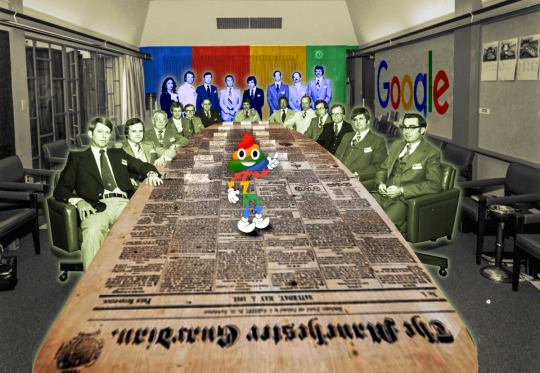
THIS WEEKEND (June 7–9), I'm in AMHERST, NEW YORK to keynote the 25th Annual Media Ecology Association Convention and accept the Neil Postman Award for Career Achievement in Public Intellectual Activity.

Look, no one wants to kick Big Tech to the curb more than I do, but, also: it's good that Google indexes the news so people can find it, and it's good that Facebook provides forums where people can talk about the news.
It's not news if you can't find it. It's not news if you can't talk about it. We don't call information you can't find or discuss "news" – we call it "secrets."
And yet, the most popular – and widely deployed – anti-Big Tech tactic promulgated by the news industry and supported by many of my fellow trustbusters is premised on making Big Tech pay to index the news and/or provide a forum to discuss news articles. These "news bargaining codes" (or, less charitably, "link taxes") have been mooted or introduced in the EU, France, Spain, Australia, and Canada. There are proposals to introduce these in the US (through the JCPA) and in California (the CJPA).
These US bills are probably dead on arrival, for reasons that can be easily understood by the Canadian experience with them. After Canada introduced Bill C-18 – its own news bargaining code – Meta did exactly what it had done in many other places where this had been tried: blocked all news from Facebook, Instagram, Threads, and other Meta properties.
This has been a disaster for the news industry and a disaster for Canadians' ability to discuss the news. Oh, it makes Meta look like assholes, too, but Meta is the poster child for "too big to care" and is palpably indifferent to the PR costs of this boycott.
Frustrated lawmakers are now trying to figure out what to do next. The most common proposal is to order Meta to carry the news. Canadians should be worried about this, because the next government will almost certainly be helmed by the far-right conspiratorialist culture warrior Pierre Poilievre, who will doubtless use this power to order Facebook to platform "news sites" to give prominence to Canada's rotten bushel of crypto-fascist (and openly fascist) "news" sites.
Americans should worry about this too. A Donald Trump 2028 presidency combined with a must-carry rule for news would see Trump's cabinet appointees deciding what is (and is not) news, and ordering large social media platforms to cram the Daily Caller (or, you know, the Daily Stormer) into our eyeballs.
But there's another, more fundamental reason that must-carry is incompatible with the American system: the First Amendment. The government simply can't issue a blanket legal order to platforms requiring them to carry certain speech. They can strongly encourage it. A court can order limited compelled speech (say, a retraction following a finding of libel). Under emergency conditions, the government might be able to compel the transmission of urgent messages. But there's just no way the First Amendment can be squared with a blanket, ongoing order issued by the government to communications platforms requiring them to reproduce, and make available, everything published by some collection of their favorite news outlets.
This might also be illegal in Canada, but it's harder to be definitive. The Canadian Charter of Rights and Freedoms was enshrined in 1982, and Canada's Supreme Court is still figuring out what it means. Section Two of the Charter enshrines a free expression right, but it's worded in less absolute terms than the First Amendment, and that's deliberate. During the debate over the wording of the Charter, Canadian scholars and policymakers specifically invoked problems with First Amendment absolutism and tried to chart a middle course between strong protections for free expression and problems with the First Amendment's brook-no-exceptions language.
So maybe Canada's Supreme Court would find a must-carry order to Meta to be a violation of the Charter, but it's hard to say for sure. The Charter is both young and ambiguous, so it's harder to be definitive about what it would say about this hypothetical. But when it comes to the US and the First Amendment, that's categorically untrue. The US Constitution is centuries older than the Canadian Charter, and the First Amendment is extremely definitive, and there are reams of precedent interpreting it. The JPCA and CJPA are totally incompatible with the US Constitution. Passing them isn't as silly as passing a law declaring that Pi equals three or that water isn't wet, but it's in the neighborhood.
But all that isn't to say that the news industry shouldn't be attacking Big Tech. Far from it. Big Tech compulsively steals from the news!
But what Big Tech steals from the news isn't content.
It's money.
Big Tech steals money from the news. Take social media: when a news outlet invests in building a subscriber base on a social media platform, they're giving that platform a stick to beat them with. The more subscribers you have on social media, the more you'll be willing to pay to reach those subscribers, and the more incentive there is for the platform to suppress the reach of your articles unless you pay to "boost" your content.
This is plainly fraudulent. When I sign up to follow a news outlet on a social media site, I'm telling the platform to show me the things the news outlet publishes. When the platform uses that subscription as the basis for a blackmail plot, holding my desire to read the news to ransom, they are breaking their implied promise to me to show me the things I asked to see:
https://www.eff.org/deeplinks/2023/06/save-news-we-need-end-end-web
This is stealing money from the news. It's the definition of an "unfair method of competition." Article 5 of the Federal Trade Commission Act gives the FTC the power to step in and ban this practice, and they should:
https://pluralistic.net/2023/01/10/the-courage-to-govern/#whos-in-charge
Big Tech also steals money from the news via the App Tax: the 30% rake that the mobile OS duopoly (Apple/Google) requires for every in-app purchase (Apple/Google also have policies that punish app vendors who take you to the web to make payments without paying the App Tax). 30% out of every subscriber dollar sent via an app is highway robbery! By contrast, the hyperconcentrated, price-gouging payment processing cartel charges 2-5% – about a tenth of the Big Tech tax. This is Big Tech stealing money from the news:
https://www.eff.org/deeplinks/2023/06/save-news-we-must-open-app-stores
Finally, Big Tech steals money by monopolizing the ad market. The Google-Meta ad duopoly takes 51% out of every ad-dollar spent. The historic share going to advertising "intermediaries" is 10-15%. In other words, Google/Meta cornered the market on ads and then tripled the bite they were taking out of publishers' advertising revenue. They even have an illegal, collusive arrangement to rig this market, codenamed "Jedi Blue":
https://en.wikipedia.org/wiki/Jedi_Blue
There's two ways to unrig the ad market, and we should do both of them.
First, we should trustbust both Google and Meta and force them to sell off parts of their advertising businesses. Currently, both Google and Meta operate a "full stack" of ad services. They have an arm that represents advertisers buying space for ads. Another arm represents publishers selling space to advertisers. A third arm operates the marketplace where these sales take place. All three arms collect fees. On top of that: Google/Meta are both publishers and advertisers, competing with their own customers!
This is as if you were in court for a divorce and you discovered that the same lawyer representing your soon-to-be ex was also representing you…while serving as the judge…and trying to match with you both on Tinder. It shouldn't surprise you if at the end of that divorce, the court ruled that the family home should go to the lawyer.
So yeah, we should break up ad-tech:
https://www.eff.org/deeplinks/2023/05/save-news-we-must-shatter-ad-tech
Also: we should ban surveillance advertising. Surveillance advertising gives ad-tech companies a permanent advantage over publishers. Ad-tech will always know more about readers' behavior than publishers do, because Big Tech engages in continuous, highly invasive surveillance of every internet user in the world. Surveillance ads perform a little better than "content-based ads" (ads sold based on the content of a web-page, not the behavior of the person looking at the page), but publishers will always know more about their content than ad-tech does. That means that even if content-based ads command a slightly lower price than surveillance ads, a much larger share of that payment will go to publishers:
https://www.eff.org/deeplinks/2023/05/save-news-we-must-ban-surveillance-advertising
Banning surveillance advertising isn't just good business, it's good politics. The potential coalition for banning surveillance ads is everyone who is harmed by commercial surveillance. That's a coalition that's orders of magnitude larger than the pool of people who merely care about fairness in the ad/news industries. It's everyone who's worried about their grandparents being brainwashed on Facebook, or their teens becoming anorexic because of Instagram. It includes people angry about deepfake porn, and people angry about Black Lives Matter protesters' identities being handed to the cops by Google (see also: Jan 6 insurrectionists).
It also includes everyone who discovers that they're paying higher prices because a vendor is using surveillance data to determine how much they'll pay – like when McDonald's raises the price of your "meal deal" on your payday, based on the assumption that you will spend more when your bank account is at its highest monthly level:
https://pluralistic.net/2024/06/05/your-price-named/#privacy-first-again
Attacking Big Tech for stealing money is much smarter than pretending that the problem is Big Tech stealing content. We want Big Tech to make the news easy to find and discuss. We just want them to stop pocketing 30 cents out of every subscriber dollar and 51 cents out of ever ad dollar, and ransoming subscribers' social media subscriptions to extort publishers.
And there's amazing news on this front: a consortium of UK web-publishers called Ad Tech Collective Action has just triumphed in a high-stakes proceeding, and can now go ahead with a suit against Google, seeking damages of GBP13.6b ($17.4b) for the rigged ad-tech market:
https://www.reuters.com/technology/17-bln-uk-adtech-lawsuit-against-google-can-go-ahead-tribunal-rules-2024-06-05/
The ruling, from the Competition Appeal Tribunal, paves the way for a frontal assault on the thing Big Tech actually steals from publishers: money, not content.
This is exactly what publishing should be doing. Targeting the method by which tech steals from the news is a benefit to all kinds of news organizations, including the independent, journalist-owned publishers that are doing the best news work today. These independents do not have the same interests as corporate news, which is dominated by hedge funds and private equity raiders, who have spent decades buying up and hollowing out news outlets, and blaming the resulting decline in readership and profits on Craiglist.
You can read more about Big Finance's raid on the news in Margot Susca's Hedged: How Private Investment Funds Helped Destroy American Newspapers and Undermine Democracy:
https://www.press.uillinois.edu/books/?id=p087561
You can also watch/listen to Adam Conover's excellent interview with Susca:
https://www.youtube.com/watch?v=N21YfWy0-bA
Frankly, the looters and billionaires who bought and gutted our great papers are no more interested in the health of the news industry or democracy than Big Tech is. We should care about the news and the workers who produce the news, not the profits of the hedge-funds that own the news. An assault on Big Tech's monetary theft levels the playing field, making it easier for news workers and indies to compete directly with financialized news outlets and billionaire playthings, by letting indies keep more of every ad-dollar and more of every subscriber-dollar – and to reach their subscribers without paying ransom to social media.
Ending monetary theft – rather than licensing news search and discussion – is something that workers are far more interested in than their bosses. Any time you see workers and their bosses on the same side as a fight against Big Tech, you should look more closely. Bosses are not on their workers' side. If bosses get more money out of Big Tech, they will not share those gains with workers unless someone forces them to.
That's where antitrust comes in. Antitrust is designed to strike at power, and enforcers have broad authority to blunt the power of corporate juggernauts. Remember Article 5 of the FTC Act, the one that lets the FTC block "unfair methods of competition?" FTC Chair Lina Khan has proposed using it to regulate training AI, specifically to craft rules that address the labor and privacy issues with AI:
https://www.youtube.com/watch?v=3mh8Z5pcJpg
This is an approach that can put creative workers where they belong, in a coalition with other workers, rather than with their bosses. The copyright approach to curbing AI training is beloved of the same media companies that are eagerly screwing their workers. If we manage to make copyright – a transferrable right that a worker can be forced to turn over their employer – into the system that regulates AI training, it won't stop training. It'll just trigger every entertainment company changing their boilerplate contract so that creative workers have to sign over their AI rights or be shown the door:
https://pluralistic.net/2024/05/13/spooky-action-at-a-close-up/#invisible-hand
Then those same entertainment and news companies will train AI models and try to fire most of their workers and slash the pay of the remainder using those models' output. Using copyright to regulate AI training makes changes to who gets to benefit from workers' misery, shifting some of our stolen wages from AI companies to entertainment companies. But it won't stop them from ruining our lives.
By contrast, focusing on actual labor rights – say, through an FTCA 5 rulemaking – has the potential to protect those rights from all parties, and puts us on the same side as call-center workers, train drivers, radiologists and anyone else whose wages are being targeted by AI companies and their customers.
Policy fights are a recurring monkey's paw nightmare in which we try to do something to fight corruption and bullying, only to be outmaneuvered by corrupt bullies. Making good policy is no guarantee of a good outcome, but it sure helps – and good policy starts with targeting the thing you want to fix. If we're worried that news is being financially starved by Big Tech, then we should go after the money, not the links.

If you'd like an essay-formatted version of this post to read or share, here's a link to it on pluralistic.net, my surveillance-free, ad-free, tracker-free blog:
https://pluralistic.net/2024/06/06/stealing-money-not-content/#content-free
#pluralistic#competition#advertising#surveillance advertising#saving the news from big tech#link taxes#trustbusting#competition and markets authority#uk#ukpoli#Ad Tech Collective Action#digital markets unit#Competition Appeal Tribunal
583 notes
·
View notes
Text










Giant Sony PSP Digital Display Billboard Ad Campaign (2004)
2K notes
·
View notes
Text
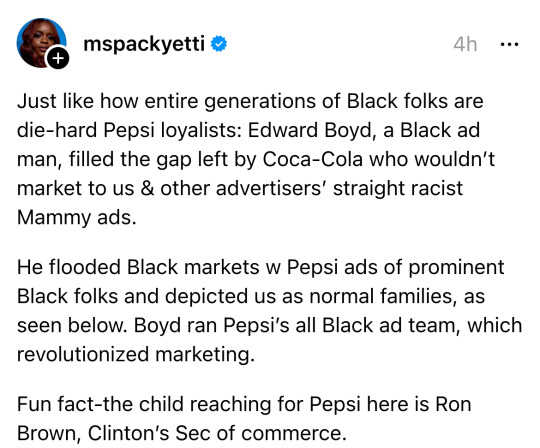
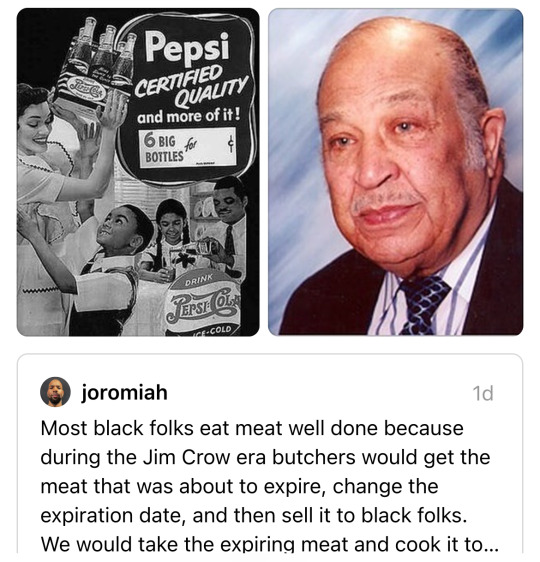

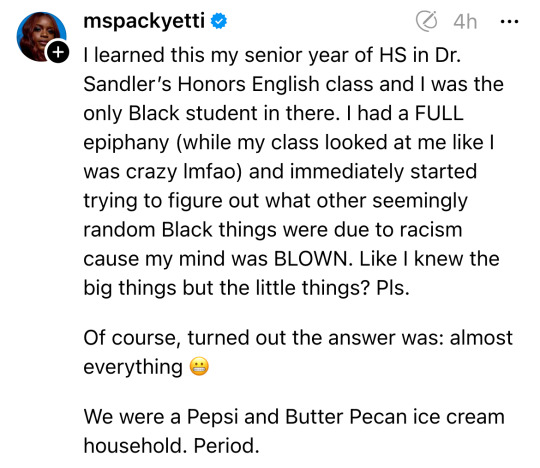


#Pepsi#Coca-Cola#Edward Boyd#advertising#Black consumers#racism#Mammy ads#Black families#Black marketing#Ron Brown
677 notes
·
View notes
Text
I see Arcane's marketing is thrusting a lot of blue on Jinx's persona, which is fine, but also a misdirection! I argue that the use of blue on Jinx represents THE IDEA that others have of Jinx rather than representing who Jinx really is. Jinx's true color, the one she paints over those closest to her, the one that represents her is PINK. Jinx is pink!
When we see Jinx in pieces either in or out of show where blue is the predominant color in the palette it's signaling to us the audience that this the Jinx that is perceived by the world around her, which includes Piltover AND Zaun. In this essay I will---
#arcane#arcane meta#jinx arcane#it feels wrong that the she's defined by blue in the teaser and marketting and even the murals#sure it's an eye-catching color but that's not jinx#it feels almost like the same mistake vi made with the whole jinx-powder dichotomy#jinx once defined by bright blue but over time that color has gradually receded from her outfit where it's more dominated by dark hues#and purple and pink#but now this misunderstanding is on a larger scale because now jinx is a symbol and is up for interpretation#like it's very interestingbthat for all the art done of jinx none has been the right shade of blue it's either light and natural in zaun#but unnaturally cold in piltover#it's what either one wants out of jinx#but the art where jinx is truly a part of it and alive is where dark palette and bright pink take over#idk it just feels like adding more blue just washes out the depth of jinx's design#it'll probably be super annoying when jinx's bday comes and people are giving her blue colored gifts#and she'd be thinking “goodgoodgreat... my favorite color is pink”#but she won't say anything bcuz a lot of the gifts are from children or something
124 notes
·
View notes
Text
Unlocking Success: System Exclusive Traffic Review Unveils Game-Changing Strategies!

What is System Exclusive Traffic?
We provide premium traffic for ANY offer in the 'Make Money Online' space. We've built System Exclusive Traffic to cater to those that have programs/systems and are looking for highly quality email traffic. Are you a product creator looking for a traffic solution for your members? If so, we easily integrate with programs or systems for those involved in Bizopp, MLM, Affiliate Programs, Crypto Opportunity Programs, and many more.
As a customer, you will get highly targeted quality traffic to help build your business. We provide excellent customer service and can take care of all your traffic needs!
As for promoters or product creators, we offer a wopping 25% commissions on all sales! We also have monthly packages that can build recurring income for you as well.
Set up System Exclusive Traffic as a stand-alone product offer or use it as an income stream for all members to promote within the system. Either way you win!
GET MORE INFO
#marketing#System Exclusive Traffic Review#System Exclusive Traffic#Marketing#Marketing Ads#Traffic#Digital Marketing#Affiliate Marketing
5 notes
·
View notes
Text
Google Ads is a paid advertising platform that helps businesses increase their visibility on Google's search engine results pages. It is important because it allows for targeted advertising, immediate traffic, and measurable results. Benefits include enhanced brand awareness, cost-effective marketing, and detailed analytics for campaign optimization. To effectively use Google Ads, businesses should focus on keyword research, ad relevance, and continuous performance monitoring.
For more details, you can check out the full article here.
#businesses advertising#ads branding#marketing creatives#marketing ads#ads strategies#ads marketing#advertising creative#google ads
0 notes
Text
seeing a speedrun of botw all dungeons and even like that .... its so strange how soulless totk feels to me when botw didnt, allthough it feels much flatter to me now since i know there wasnt any thought put into the things i thought were meaningful and that it will go nowhere in the end
and yet still it feels like its got soul that totk just hasnt; botw is far from perfect, like everything really, but totk to me really feels like a clunky grind game with no trust in the player at all, be it puzzles or 'story', and a fundamental missunderstanding of why botws world design and structure worked well as a whole in the end
i honestly still cant quite understand how on earth botw got totk as its 'sequel', all the things that needed work in botw where neglected or made worse totk while it also failed to follow up on literally anything in a meaningful way- when i still think the changes it needed where so OBVIOUS and the directions to follow up and expand on things to enhance not just the sequel but also botw in retrospect where so plenty and ready for the taking, it hurts me still even to think about it not being done and everything really being actively thrown away for NOTHING or things that make it AND botw WORSE in retrospect instead
i wont ever be able to forgive that, and some part of me hopes that this is the worst that they will ever do so at least we will get better games again in the future
#ganondoodles talks#zelda#ganondoodles rants#ALSO totk has such a weird vibe of ... virality(??) to it#like some things really do feel like it was primarily made bc a few people would built fucked up shit in it that would go viral#like free marketing#like clickbait or fake closing x symbols in mobile gacha game ads#also the story sucks so bad in totk....... if you can even call it that#flyers of the same few sentence of made up story of divine right of kings propaganda stuck on every wall suddendly simulator#that ends in nothing#literally everythings the same except for we made the princess doubting her divine right kingdom believe in it again woohoo#hhhh seeing botw and it just made me mad about totk again#whyyyyyyyyyyyyyyyyyyyyyyyyyyyyyyyy#you could have been so much yet you chose to be nothing instead
119 notes
·
View notes
Text

#kirby#daily kirby#my art#digital#hal laboratory#nintendo#we went to the japanese market that recently added a whole section of gachapon machines :)#I got kirby things ofc
97 notes
·
View notes
Text
Thursday, August 3.
vintage ads.
Capitalism: bad. Vintage ads: good.
Or so dictates the paradoxical logic that we have decided for ourselves, and when the question is this awkward, the answer is obvious: to stick our collective heads in the sand and simply enjoy the pretty things. And goodness, they are pretty. The problems with advertising, and its seductive evils, are laid bare by this selection of ads handpicked from the dashboard. The common thread between all of these ads is that they have been produced by corporations whose end goal and very purpose is to convince you (against your better judgment, or circumstances) to spend your money (money which you need) on their products (products which you don't—and possibly can't really afford.)
Similarly demonstrated, however, is the irresistible nostalgic glamour. Perhaps when contemporary advertising tries so hard to be a meme, or be funny, or be quirky and off-beat (or perhaps more simply put, tries too hard) there is a genuine allure in classic adverts that, even now, feel so effortlessly stylish. This effortlessness is also paradoxical because, like the products they often advertise, they are the result of hard work, time, dedication, from those at the peak of their craft. Like these products, they were made for leisurely, long-term use and enjoyment, and not to be so quickly consumed and discarded. What we're really saying, I suppose, is when #advertising is this slick, and pleasing to the eye, we must simply ask that you be quiet, promptly, and accept our money.
And remember, folks, one eye on the pretty ads, the other guarding your piggy banks x
#today on tumblr#vintage ads#vintage advertising#vintage advertisement#advertising#ads#marketing#vintage#70s vintage#capitalism#anti capitalism#the one ring#willpower#branding
546 notes
·
View notes
Text


[まつだひかり]
#art#sketch#logitech#tech#electronics#matsuda hikari#logitech marketing take notes#this is how you make an ad
107 notes
·
View notes